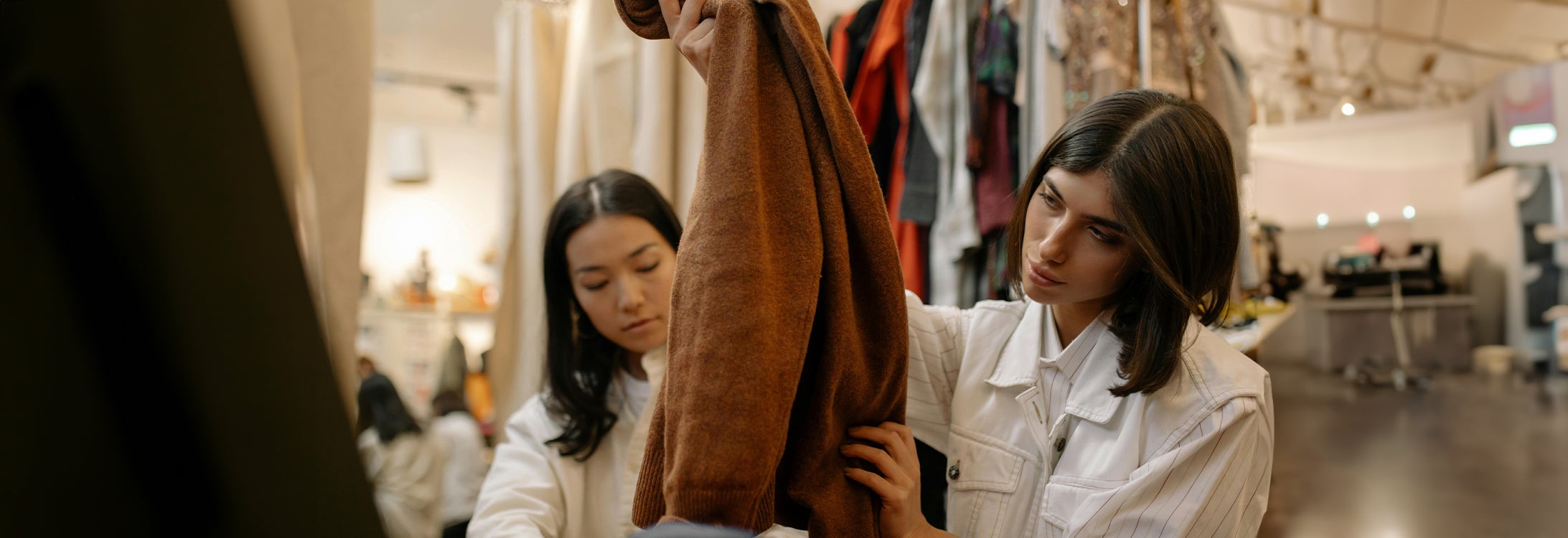BS in Interior Design and Fashion Merchandising: Fashion Merchandising Concentration
Are you passionate about the intersection of style, retail environments, and consumer behavior? Do you have a keen eye for trends and a knack for visual storytelling? Are you interested in shaping the future of sustainable fashion practices?
The Fashion Merchandising program at East Carolina University (ECU) shows its commitment to excellence, industry, and education through its affiliation with the Textile and Apparel Programs Accreditation Commission (TAPAC), which ensures that our curriculum meets rigorous industry standards.
At ECU, students in Fashion Merchandising are not just students; they are part of a dynamic community that offers unique opportunities. Our faculty, members of the International Textile and Apparel Association and affiliated with the National Retail Federation, contribute to fashion education and guide students through a curriculum rich in retail strategy, trend forecasting, brand management, and merchandising techniques.
Through hands-on projects, internships with leading fashion brands, and access to state-of-the-art labs and digital merchandising tools, students gain practical skills and industry knowledge necessary to thrive in the dynamic world of fashion merchandising. Whether your passion lies in visual merchandising, retail analytics, sustainable fashion practices, or global market trends, ECU equips you with the tools to make a lasting impact in this exciting and evolving industry.
Possible Career Opportunities
Studying fashion merchandising offers several diverse career opportunities:
Fashion Merchandiser/Buyer: Selects and purchases apparel and accessories for retail stores or fashion brands based on market trends and sales data
Retail Management: Oversees daily operations of retail stores, including staff, inventory, and merchandising strategies.
Visual Merchandiser: Designs visual displays and store layouts to attract customers and enhance the shopping experience.
Fashion Marketing Specialist: Develops and executes marketing campaigns to promote fashion brands or retail stores.
Fashion Stylist: Creates stylish outfits for fashion shoots, events, or personal clients.
Product Development: Oversees the creation and development of new fashion products, collaborating with designers, manufacturers, and marketers.
Fashion Consultant: Provides expert advice on fashion trends, wardrobe styling, brand positioning, and retail strategies.
Merchandise Planner: Analyzes sales data and market trends to forecast demand and optimize inventory levels for retail stores or fashion brands.
E-commerce Management: Manages online sales platforms for fashion brands, optimizing customer experience and implementing digital marketing strategies.
Brand Management: Oversees the overall brand strategy and identity for fashion brands.
Fashion Entrepreneur: Starts a fashion-related business, such as a boutique, online store, fashion consultancy, or stylist agency.
These career opportunities highlight the versatility and breadth of skills that graduates with a fashion merchandising concentration can apply across various sectors within the fashion industry and beyond, preparing them for rewarding careers in the evolving world of fashion and retail.
Admission Requirements
Students can declare their interest in fashion merchandising and consumer studies upon entry to the university or after. The admission process is straightforward, and our academic advisors will guide you every step of the way.
Program Requirements
Computer Requirements and Software List
Students must also maintain a minimum grade of C (2.0) or better in all merchandising major courses throughout the program. These expectations ensure students have a strong academic foundation and the ability to demonstrate their skills through assignments and portfolios and to document abilities aligned with industry needs.
Internship Requirements and Experience
IDFM 3000—Internship 1 requires 200 clock hours of onsite work experience over the semester.
IDFM 4000—Internship 2 requires 200 clock hours of onsite advanced work experience over the semester.
Student Opportunities and Experiences
Interior Design Student Organization, Apparel And Interior Merchandising Organization, National Retail Federation Student Association at East Carolina University, Fashion Club
Delivery Methods
This program uses on-campus, face-to-face, and distance education formats to deliver content.
Accreditation Information
East Carolina University’s fashion merchandising concentration is affiliation membership with the Textile and Apparel Programs Accreditation Commission (TAPAC). It uses the International Textile and Apparel Association’s Meta Goals design for four-year Baccalaureate programs as a foundation for curriculum planning and assessment to advance excellence in professional preparedness.
Institutional and Professional Licensure Disclosures for Enrolled and Prospective Students
ECU degree programs satisfy the professional licensure and/or certification requirements in North Carolina and prepare students to sit for these exams. However, requirements in other states may be different.
If you are considering a degree program that may, would, could or potentially lead to a professional license and/or certification, please note that at this time ECU may or may not be able to advise whether a program meets requirements outside of North Carolina. Prior to enrolling in a degree program, please discuss this important topic with your program of interest.
